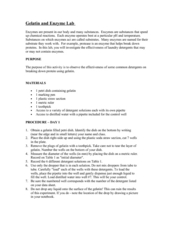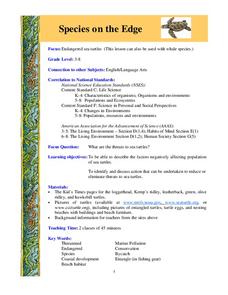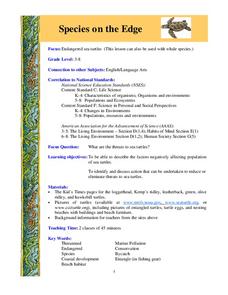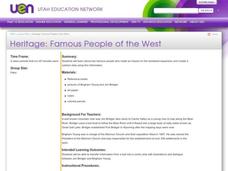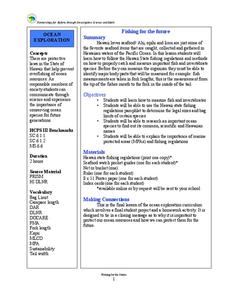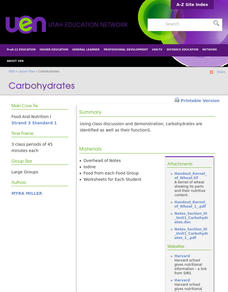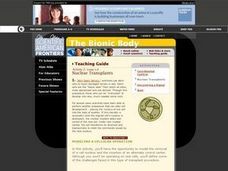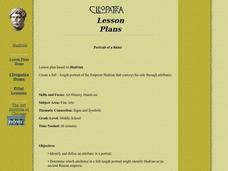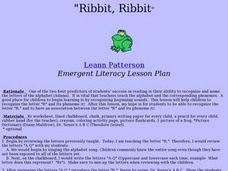Curated OER
Texture: Wild Things
Students experiment with different kinds of marking techniques. They read "Where the Wild Things Are" and observe animals for pattern and line. They compare illustrations with Haring's images. They create a symbolic drawing of animal.
Curated OER
Composting in Schools: Observing Compost Microorganisms
Students explore composting. In this composting lesson plan, students use compound microscopes to observe the microbial communities in compost. Observations and documentation of changes will occur over the course of several weeks.
Curated OER
The Moon Book
In this moon instructional activity, learners read the book The Moon Book and list facts about the moon and draw eclipses. Students list 10 facts and draw 3 kinds of eclipses.
Curated OER
Carbon for the World
Pupils explore the presence of carbon in the world. In this environmental stewardship lesson, students discuss the carbon cycle after they read assigned textbook pages. Pupils also discuss biomass content in different parts of the world.
Curated OER
Gelatin and Enzyme Lab
Learners observe the effectiveness of detergents on breaking down proteins. In this investigative lesson students participate in an activity that shows how proteins are broken down in gelatin and fill out a worksheet.
Curated OER
Palette Knife Painting Inspired by the Works of Brian Rutenburg
Students explore the works of Brian Rutenburg. In this art lesson, students create a work of art using acrylic paint and palette knives inspired by the works of Rutenburg. Students write about their artwork.
Curated OER
Bird Buffet
Fifth graders study traits of different bird beaks. For this bird lesson, 5th graders explore the function and usefulness of different inherited traits of birds.
Curated OER
Species on the Edge
Learners study science. In this endangered species lesson, students examine sea turtles and actions that can be taken to help keep them alive. They work in small groups to research different species of turtles and share their information...
Curated OER
Species on the Edge
Students examine sea turtles. In this endangered species instructional activity, students analyze sea turtle habitats. Students hypothesize why sea turtles could go extinct.
Curated OER
The Growth of Islam
Seventh graders gain insight into the daily lives of Muslims and to develop empathy for them by studying the Islamic world and creating presentations.
Curated OER
Looking Inside Cells
Seventh graders examine the functions and roles of membranes in cells. They discover the differences between plant and animal cells.
Curated OER
Heritage: Famous People of the West
Fourth graders investigate the impact of Brigham Young and Jim Bridger on westward expansion. They conduct research, develop a class information chart, and create a cartoon strip depicting what happened when Jim Bridger and Brigham Young...
Curated OER
Fishing for the Future
Students research Hawaii's fishing regulations. In this conservation lesson, students explore the reasons behind ocean conservation. Resources are provided.
Curated OER
Carbohydrates
Students listen to a lecture on carbohydrates focusing on the differences between complex and simple carbohydrates. They complete a demonstration and worksheet.
Curated OER
Break the Fast: The Start to Good Health
Students explore why eating a nutritious breakfast on a regular basis is important.
Curated OER
Nuclear Transplants
Young scholars model the removal of a cell nucleus and the insertion of an alternate control center. They define some of the challenges faced in this type of transplant procedure. Students discuss cloning.
Curated OER
Portrait of a Ruler
Students create a full-length portrait of the Emperor Hadrian that conveys his role through attributes and explain how this bust of Hadrian conveys a story about life as an emperor in ancient Rome.
Curated OER
Renkly Relief/Collage Painting
Students study the use of texture, and rhythm as a principle of design when showing movement in a painting.
Curated OER
Mussel Movements
Students consider the impact of invasive species on local environments. In this ecology lesson, watch the video, Arizona Wildlife Views, which focuses on invasive species. Students develop vocabulary, relate to meaningful comprehension...
Curated OER
Rikki-Tikki Research
Fourth graders perform a search on mongooses on Internet Explorer and answer research questions.
Curated OER
Pies: A Practical Application
Students participate in making a pie. They are to discuss the nutritional value and the different types of pies. They also answer questions from the teacher about fat and they complete a pie evaluation form.
Curated OER
Children's Health: Children Aren't Little Adults
This instructional activity is a compilation of interdisciplinary, technology-infused activities that focus on the often complicated and sometimes controversial issues related to toxic chemicals in children's environment. Special...
Curated OER
Cell Community
Seventh graders use technology to review cell structure and function. In this cells less, 7th graders review the parts and functions of a cell, and use photography/video and PowerPoint to enhance their explorations.
Curated OER
Ribbit! Ribbit!
Students research a frog's life cycle and habitat using books, the Internet and lecture. Students make origami frogs, write letters to Toad from Arnold Lobel's "Frog and Toad" and participate in a simulated camouflage activity.






